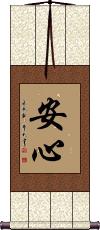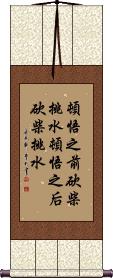Many custom options...
And formats...

Let It Be Be Relieved in Chinese / Japanese...
Buy a Let It Be Be Relieved calligraphy wall scroll here!
Personalize your custom “Let It Be Be Relieved” project by clicking the button next to your favorite “Let It Be Be Relieved” title below...
Let It Be / Be Relieved
眉を開く is a Japanese proverb and expression that means “to feel relieved,” “to forget about one's troubles,” or “to settle into peace of mind.”
The literal words suggest relaxing your eyebrows or face. Allow worry or concern to go away, and just be content with “letting it be.”
Note: Because this selection contains some special Japanese Hiragana characters, it should be written by a Japanese calligrapher.
Peaceful Heart / Peace of Mind / Calm Mind
安心 can be defined as relief, peace of mind, feeling at ease, to be relieved, to set one's mind at rest, and easiness.
安心 is a nice word that encompasses great meanings within just two characters. Some of the other meanings include pacifying, settling the mind, and peace of mind. It's also the idea of feeling a sense of security, safety, and confidence in your state of well-being.
This can be used by everyone, but some consider it to be a Buddhist concept (You'll find it in your Zen dictionary).
Note: Can be romanized as Anshin or Anjin in Japanese.
Chop Wood, Carry Water
Before enlightenment or after, chores remain.
頓悟之前砍柴挑水; 頓悟之後砍柴挑水 means “Before enlightenment, chop wood, carry water; After enlightenment, chop wood, carry water.
This is a Chinese proverb that is attributed to 吴力 (Wú Lì) who lived between 1632 and 1718 - living part of his life as a devout Buddhist, and many years as a Catholic Jesuit Priest in China - what an interesting life!
This has been explained many times in many ways. I am a Buddhist, and here is my brief take on this proverb...
Before enlightenment, one may find daily chores mundane, tedious, and boring. However, upon reaching enlightenment one is not relieved of the details of daily life. An enlightened person will, however, see such chores as a joy, and do them mindfully.
There is another version floating around, which is 在你領悟之前砍柴、運水。在你領悟之後,砍柴、運水。
If you want this other version, just contact me. The meaning is the same, just different phrasing.
Push or Knock
To weigh one's words
During the Tang Dynasty, a man named Jia Dao (born in the year 779), a well-studied scholar and poet, went to the capital to take the imperial examination.
One day as he rides a donkey through the city streets, a poem begins to form in his mind. A portion of the poem comes into his head like this:
“The bird sits on the tree branch near a pond,
A monk approaches and knocks at the gate...”
At the same time, he wondered if the word “push” would be better than “knock” in his poem.
As he rides down the street, he imagines the monk pushing or knocking. Soon he finds himself making motions of pushing and shaking a fist in a knocking motion as he debates which word to use. He is quite a sight as he makes his way down the street on his donkey with hands and fists flying about as the internal debate continues.
As he amuses people along the street, he becomes completely lost in his thoughts and does not see the mayor's procession coming in the opposite direction. Jia Bao is blocking the way for the procession to continue down the road, and the mayor's guards immediately decide to remove Jia Bao by force. Jia Bao, not realizing that he was in the way, apologizes, explains his poetic dilemma and awaits his punishment for blocking the mayor's way.
The mayor, Han Yu, a scholar and author of prose himself, finds himself intrigued by Jia Dao's poem and problem. Han Yu gets off his horse and addresses Jia Bao, stating, “I think knock is better.” The relieved Jia Bao raises his head and is invited by the mayor to join the procession, and are seen riding off together down the street, exchanging their ideas and love of poetry.
In modern Chinese, this 反復推敲 idiom is used when someone is trying to decide which word to use in their writing or when struggling to decide between two things when neither seems to have a downside.
Not the results for let it be be relieved that you were looking for?
Below are some entries from our dictionary that may match your let it be be relieved search...
| Characters If shown, 2nd row is Simp. Chinese |
Pronunciation Romanization |
Simple Dictionary Definition |
安心 see styles |
ān xīn an1 xin1 an hsin anshin あんしん |
More info & calligraphy: Peaceful Heart / Peace of Mind / Calm Mind{Buddh} obtaining peace of mind through faith or ascetic practice; (female given name) Anshin To quiet the heart, or mind; be at rest. |
放心 see styles |
fàng xīn fang4 xin1 fang hsin houshin / hoshin ほうしん |
More info & calligraphy: No Worries(n,vs,vi) (1) absentmindedness; (n,vs,vi) (2) peace of mind absentmindedness |
眉を開く see styles |
mayuohiraku まゆをひらく |
More info & calligraphy: Let It Be / Be Relieved |
寛泰 see styles |
kuān tài kuan1 tai4 k`uan t`ai kuan tai hiroyasu ひろやす |
(given name) Hiroyasu relieved |
寬心 宽心 see styles |
kuān xīn kuan1 xin1 k`uan hsin kuan hsin |
relieved; comforted; to relieve anxieties; at ease; relaxed; reassuring; happy |
寬慰 宽慰 see styles |
kuān wèi kuan1 wei4 k`uan wei kuan wei |
to console; to soothe; relieved |
寬緩 宽缓 see styles |
kuān huǎn kuan1 huan3 k`uan huan kuan huan |
relieved; tensions relax |
晴々 see styles |
harebare はればれ seisei / sese せいせい |
(adv,adv-to,vs) bright; cheerful; (adv-to,adv,vs) (kana only) feeling refreshed; feeling relieved |
晴晴 see styles |
harebare はればれ seisei / sese せいせい |
(adv,adv-to,vs) bright; cheerful; (adv-to,adv,vs) (kana only) feeling refreshed; feeling relieved |
清々 see styles |
seisei / sese せいせい |
(adv-to,adv,vs) (kana only) feeling refreshed; feeling relieved |
清清 see styles |
seisei / sese せいせい |
(adv-to,adv,vs) (kana only) feeling refreshed; feeling relieved |
釋然 释然 see styles |
shì rán shi4 ran2 shih jan |
relieved; at ease; feel relieved |
鬆快 松快 see styles |
sōng kuai song1 kuai5 sung k`uai sung kuai |
less crowded; relieved; relaxed; to relax |
休まる see styles |
yasumaru やすまる |
(v5r,vi) to be rested; to feel at ease; to repose; to be relieved |
卸肩兒 卸肩儿 see styles |
xiè jiān r xie4 jian1 r5 hsieh chien r |
lit. a weight off one's shoulders; fig. to resign a post; to lay down a burden; to be relieved of a job |
安まる see styles |
yasumaru やすまる |
(v5r,vi) to be rested; to feel at ease; to repose; to be relieved |
お役ご免 see styles |
oyakugomen おやくごめん |
dismissal; firing; retirement; being relieved from one's post; being relieved of a burden |
お役御免 see styles |
oyakugomen おやくごめん |
dismissal; firing; retirement; being relieved from one's post; being relieved of a burden |
さっぱり see styles |
sappari さっぱり |
(adv,adv-to,vs) (1) (onomatopoeic or mimetic word) feeling refreshed; feeling relieved; (adv,adv-to,vs) (2) neat; tidy; clean; (adv,adv-to,vs,adj-na) (3) frank; open-hearted; plain; simple; light; (adv,adv-to) (4) completely; entirely; (adverb) (5) not in the least (with neg. verb); not at all; (adjectival noun) (6) nothing at all; completely useless; hopeless; awful |
さばさば see styles |
sabasaba さばさば |
(adv,adv-to,vs) (1) (onomatopoeic or mimetic word) relieved; refreshed; (adv,adv-to,vs) (2) (onomatopoeic or mimetic word) frank; candid; easy-going; laid-back |
如釋重負 如释重负 see styles |
rú shì zhòng fù ru2 shi4 zhong4 fu4 ju shih chung fu |
as if relieved from a burden (idiom); to have a weight off one's mind |
御役ご免 see styles |
oyakugomen おやくごめん |
dismissal; firing; retirement; being relieved from one's post; being relieved of a burden |
御役御免 see styles |
oyakugomen おやくごめん |
dismissal; firing; retirement; being relieved from one's post; being relieved of a burden |
胸がすく see styles |
munegasuku むねがすく |
(exp,v5k) to feel relieved; to feel satisfied; to feel refreshed |
能施太子 see styles |
néng shī tài zǐ neng2 shi1 tai4 zi3 neng shih t`ai tzu neng shih tai tzu Nōse Taishi |
Prince 'Giver', a former incarnation of Śākyamuni, when he obtained the magic dragon, pearl and by its power relieved the needs of all the poor. |
お役ごめん see styles |
oyakugomen おやくごめん |
dismissal; firing; retirement; being relieved from one's post; being relieved of a burden |
御役ごめん see styles |
oyakugomen おやくごめん |
dismissal; firing; retirement; being relieved from one's post; being relieved of a burden |
愁眉を開く see styles |
shuubiohiraku / shubiohiraku しゅうびをひらく |
(exp,v5k) to feel relieved |
気が抜ける see styles |
kiganukeru きがぬける |
(exp,v1) (1) to feel exhausted (after having been stressed); to feel spent; to feel relieved (from stress); (2) to become stale (i.e. of a carbonated beverage); to go flat; to lose flavor; to lose flavour |
荷が下りる see styles |
nigaoriru にがおりる |
(exp,v1) to feel relieved; to feel happy after having been relieved of a responsibility; to be relieved from a duty |
Click here for more let it be be relieved results from our dictionary
The following table may be helpful for those studying Chinese or Japanese...
| Title | Characters | Romaji (Romanized Japanese) | Various forms of Romanized Chinese | |
| Let It Be Be Relieved | 眉を開く | mayu o hira ku mayuohiraku | ||
| Peaceful Heart Peace of Mind Calm Mind | 安心 | an shin / anshin | ān xīn / an1 xin1 / an xin / anxin | an hsin / anhsin |
| Chop Wood, Carry Water | 頓悟之前砍柴挑水頓悟之后砍柴挑水 顿悟之前砍柴挑水顿悟之后砍柴挑水 | dùn wù zhī qián kǎn chái tiāo shuǐ dùn wù zhī hòu kǎn chái tiāo shuǐ dun4 wu4 zhi1 qian2 kan3 chai2 tiao1 shui3 dun4 wu4 zhi1 hou4 kan3 chai2 tiao1 shui3 dun wu zhi qian kan chai tiao shui dun wu zhi hou kan chai tiao shui | tun wu chih ch`ien k`an ch`ai t`iao shui tun wu chih hou k`an ch`ai t`iao shui tun wu chih chien kan chai tiao shui tun wu chih hou kan chai tiao shui |
|
| Push or Knock | 反復推敲 反复推敲 | fǎn fù tuī qiāo fan3 fu4 tui1 qiao1 fan fu tui qiao fanfutuiqiao | fan fu t`ui ch`iao fanfutuichiao fan fu tui chiao |
|
| In some entries above you will see that characters have different versions above and below a line. In these cases, the characters above the line are Traditional Chinese, while the ones below are Simplified Chinese. | ||||
Successful Chinese Character and Japanese Kanji calligraphy searches within the last few hours...







